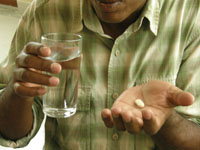29.4 PLHIV should take medication as prescribed
In Study Session 23, you learnt about the importance of adherence to ART for PLHIV. Remember that 100% adherence is the goal for patients who are on ART so that HIV replication is suppressed (Figure 29.3).

What are the consequences of poor adherence for the health of a person living with HIV?
Poor adherence may lead to drug resistance, increased viral load, decreased levels of CD4 lymphocytes, higher incidence of opportunistic infections and faster progression to AIDS, and increased possibility of sickness and death.
Therefore, educating patients about essential points of good adherence to treatment at regular visits is essential to promote health for PLHIV, and to strengthen positive living. For example, you should make sure that HIV-positive patients understand that HIV has no cure, that HIV infection is at present a lifelong condition, but also that medications can help a patient live a healthier and longer life.
Adherence is not restricted to ARV drugs, and should include medication (such as cotrimoxazole) for prevention of opportunistic infections. The message given to patients should be concise and clear. Here is an example:
‘You may feel well now but, if you want to stay healthy, you should take all your medications regularly and consistently.’
In addition, medications may be available to help manage some side-effects of ART, such as pain, vomiting and diarrhoea. Although strict adherence to these treatments is not as critical for the long-term health of PLHIV as it is for adherence to ART and opportunistic infection prophylaxis, all medications should be taken in the proper doses and on time for them to be effective in improving a patient’s health.
Lifestyle and unprescribed medications may influence the outcome of ART. Many herbal/traditional medications can interact with ARV or prophylactic drugs and render them less effective. Thus, patients should not take any medication without first consulting their respective health worker. Alcohol, cigarettes, and chewing ‘khat’ may also interfere with ART or prophylactic medication, and these should be avoided. In addition, these lifestyle choices will have a negative effect on the overall health (in particular, the function of the immune system) of the patient, who will then become more susceptible to opportunistic infections.
29.3 PLHIV should be informed about their health
